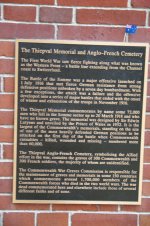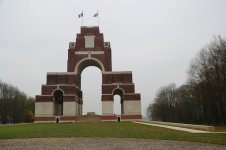You are using an out of date browser. It may not display this or other websites correctly.
You should upgrade or use an alternative browser.
You should upgrade or use an alternative browser.
Lest We Forget.
- Thread starter Stephen B
- Start date
Bob Marino
Member
- Joined
- Jan 16, 2007
- Messages
- 3,263
Right on. One of the reasons we are all here is because so many gave their lives.
Sparktrician
Member
- Joined
- Dec 4, 2009
- Messages
- 4,607
A visit to The Wall in DC gives one a perspective on the losses of so many good people. Every time I go, I am reminded not only of those whose lives were lost in the conflict, but of those whose lives were adversely affected after returning home, and of those who died as a result of wounds incurred in country. Just across the river in Arlington, the Gardens of Stone remind one of the magnitude of the losses of Americans in all conflicts. I am humbled by their sacrifices.
sancho57
Member
- Joined
- Jan 13, 2011
- Messages
- 7,089
Cheese
Member
- Joined
- Jan 16, 2015
- Messages
- 12,505
Truly, the 2 most emotionally draining experiences I’ve experienced are the Martin Luther King memorial in San Francisco and the Vietnam memorial in DC. There’s nothing quite like either one of them. Words can’t explain...both are not for the feeble hearted. They will change your vision of the future for ever. Weeping is not an option...it’s mandatory.
sancho57
Member
- Joined
- Jan 13, 2011
- Messages
- 7,089
little history:
The Battle of Belleau Wood began on June 6, 1918, and would prove to be one of the most ferocious battles fought by American troops during the war. The 5th and 6th Marine Regiments, under the command of the U.S. Army's 2nd Division, were tasked with capturing Belleau Wood and clearing it of German soldiers.
To launch their assault on the forest, the Marines first had to cross a wheat field into oncoming German machine gun fire. Trying to cross the field proved to be an incredibly dangerous undertaking and over 1,000 Marines died on the first day of battle, more than the Corps had lost in it's entire 143 year history up to that point.
After three weeks of brutal tree-to-tree fighting, including multiple charges on German machine gun nests with fixed bayonets and hand-to-hand combat, and after trading possession of the forest with the Germans six times, the Marines cleared Belleau Wood of the German Army entirely on June 26, at the cost of almost 2,000 Marines dead and almost 8,000 injured. The battle proved to be the end to the last major German offensive of the war, and less than six months later the war came to an end.
Legacy
The Battle of Belleau Wood was a landmark event in Marine Corps history. Prior to the battle, the United States Marine Corps was a little known, unproven commodity. After three weeks of displaying the courage, determination, and win-at-all-costs attitude that has become synonymous with the Marine Corps in the years since, that all changed, and the Marines have since been known as--arguably--the most formidable fighting force in the world.
It was also here that the Marine Corps' "Devil Dog" nickname was supposedly born. As the story goes, German officers, in their battle reports, referred to the Marines as "Teufel Hunden" (German for "Devil Dogs") as a result of the ferocity with which the Marines fought, and the name stuck.
After the battle, the French Army renamed Belleau Wood in honor of the Marines, changing the name to "Bois de la Brigade de Marine"--"The Wood of the Marine Brigade." Furthermore, the 5th and 6th Marine Regiments received the Croix de Guerre, an award for distinction and heroism in combat with the enemy, three times during the First World War--the only regiments in the American Expeditionary Force to do so. As a result, The 5th and 6th Marine Regiments are authorized to wear the French fourragere,a military award that distinguishes military units as a whole and that is shaped like a braided cord, on their dress uniforms.
The Battle of Belleau Wood began on June 6, 1918, and would prove to be one of the most ferocious battles fought by American troops during the war. The 5th and 6th Marine Regiments, under the command of the U.S. Army's 2nd Division, were tasked with capturing Belleau Wood and clearing it of German soldiers.
To launch their assault on the forest, the Marines first had to cross a wheat field into oncoming German machine gun fire. Trying to cross the field proved to be an incredibly dangerous undertaking and over 1,000 Marines died on the first day of battle, more than the Corps had lost in it's entire 143 year history up to that point.
After three weeks of brutal tree-to-tree fighting, including multiple charges on German machine gun nests with fixed bayonets and hand-to-hand combat, and after trading possession of the forest with the Germans six times, the Marines cleared Belleau Wood of the German Army entirely on June 26, at the cost of almost 2,000 Marines dead and almost 8,000 injured. The battle proved to be the end to the last major German offensive of the war, and less than six months later the war came to an end.
Legacy
The Battle of Belleau Wood was a landmark event in Marine Corps history. Prior to the battle, the United States Marine Corps was a little known, unproven commodity. After three weeks of displaying the courage, determination, and win-at-all-costs attitude that has become synonymous with the Marine Corps in the years since, that all changed, and the Marines have since been known as--arguably--the most formidable fighting force in the world.
It was also here that the Marine Corps' "Devil Dog" nickname was supposedly born. As the story goes, German officers, in their battle reports, referred to the Marines as "Teufel Hunden" (German for "Devil Dogs") as a result of the ferocity with which the Marines fought, and the name stuck.
After the battle, the French Army renamed Belleau Wood in honor of the Marines, changing the name to "Bois de la Brigade de Marine"--"The Wood of the Marine Brigade." Furthermore, the 5th and 6th Marine Regiments received the Croix de Guerre, an award for distinction and heroism in combat with the enemy, three times during the First World War--the only regiments in the American Expeditionary Force to do so. As a result, The 5th and 6th Marine Regiments are authorized to wear the French fourragere,a military award that distinguishes military units as a whole and that is shaped like a braided cord, on their dress uniforms.
Stephen B
Member
- Joined
- May 6, 2013
- Messages
- 2,749
[size=13pt][member=10147]jobsworth[/member]
If you can get it, have a look at Peter FitzSimons's book/audio book - 'Monash's Masterpiece, The Battle of Le Hamel and the 93 mins that changed the World'. This Battle was the first in which aerial, artillery, tank and infantry were used in syncranised unison. Significantly for historians of American World War 1 involvement it was the first battle that involved US troops, and fighting alongside Australian and Commonwealth troops. FitzSimons propositions that here a bond was formed that has survived - WW11, Korea, Vietnam, Iraq and Afghanistan. I think he is laying it on a bit thick here, but certainly there have been many conflicts since and involving US and Australian military personnel.
[member=44099]Cheese[/member] [member=7493]Sparktrician[/member]
Agree with you re US Vietnam Memorial in Washington DC. It, and the Honour Wall at the Australian War Memorial in a Canberra, and the Australian WW1 Cemetery at Villers -Bretonneux (Somme - France) are all places I have teared up.
[size=16pt]Australian War Memorial, Canberra - line of marble army blankets, each one representing Australian Military War dead from Afghanistan.
If you can get it, have a look at Peter FitzSimons's book/audio book - 'Monash's Masterpiece, The Battle of Le Hamel and the 93 mins that changed the World'. This Battle was the first in which aerial, artillery, tank and infantry were used in syncranised unison. Significantly for historians of American World War 1 involvement it was the first battle that involved US troops, and fighting alongside Australian and Commonwealth troops. FitzSimons propositions that here a bond was formed that has survived - WW11, Korea, Vietnam, Iraq and Afghanistan. I think he is laying it on a bit thick here, but certainly there have been many conflicts since and involving US and Australian military personnel.
[member=44099]Cheese[/member] [member=7493]Sparktrician[/member]
Agree with you re US Vietnam Memorial in Washington DC. It, and the Honour Wall at the Australian War Memorial in a Canberra, and the Australian WW1 Cemetery at Villers -Bretonneux (Somme - France) are all places I have teared up.
[attachimg=1]
[size=16pt]Australian War Memorial, Canberra - line of marble army blankets, each one representing Australian Military War dead from Afghanistan.
Attachments
Good Marine Corps history [member=10147]jobsworth[/member]. My father, who recently passed away at 96, was in the 4th Marine Division and fought on Iwo Jima, among other battles. Those were some men!
Another place that is very emotional is the American cemetery at Normandy. If you haven't been, you really must go.
Another place that is very emotional is the American cemetery at Normandy. If you haven't been, you really must go.
sancho57
Member
- Joined
- Jan 13, 2011
- Messages
- 7,089
I"ve been there. Over 10,000 Americans buried there. Teared up hard not to. When you consider America is one of the few countries that sends its dead home to e buried. So the 10,000 is really mind boggling.
The American Cemetery in Luxembourg is another one that will cause you to tear up. Gen Patton is buried there facing his troops. not as big as Colville (Normandy) but still will bring tears to yer eyes.
The American Cemetery in Luxembourg is another one that will cause you to tear up. Gen Patton is buried there facing his troops. not as big as Colville (Normandy) but still will bring tears to yer eyes.
Bob Marino
Member
- Joined
- Jan 16, 2007
- Messages
- 3,263
Thanks! It's amazing how one post generates this interesting information.
Michael Kellough
Member
- Joined
- Jan 23, 2007
- Messages
- 7,096
My wife swims at the local fitness center with a 94 year old Navy veteran.
He was served on a Navy Underwater Demolition Team in the Pacific, including Iwo Jima (although if you want to be his friend you don’t ask him to talk about it).
He and the men he served with are revered by the Navy SEALS as their founders.
He was served on a Navy Underwater Demolition Team in the Pacific, including Iwo Jima (although if you want to be his friend you don’t ask him to talk about it).
He and the men he served with are revered by the Navy SEALS as their founders.
Similar threads
- Replies
- 24
- Views
- 1K
- Replies
- 39
- Views
- 2K






